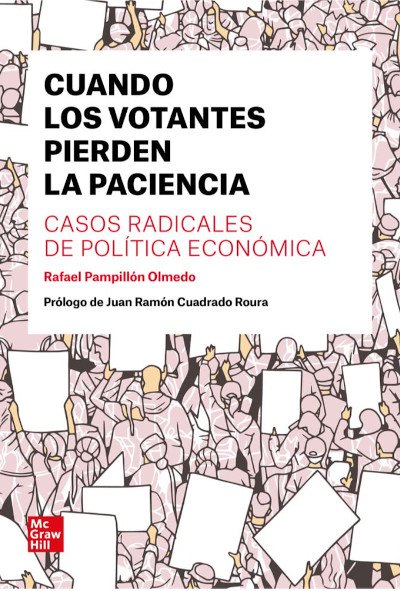In the picture
Cover of Rafael Pampillón Olmedo's book 'Cuando los votantes pierden la paciencia. Radical cases of economic policy' (Aravaca: McGraw Hill, 2022) 133 pages
International politics today is viewed through a geopolitical lens, and geopolitics has an increasingly strong geo-economic component. But to understand the economic pulse of the great powers, beyond access to natural resources and energy security, it is necessary to look at their economic health: evolution of GDP, indebtedness, inflation, balance of payments, reserves, and so on. And these elements are marked by the economic policy applied by each.
The economic history of the last two centuries is a pendulum swing between a barely intervened market and a greater state presence in productive activity; that is, between supply and demand policies or, to put a label on it, between free-market and Keynesian recipes. The world has oscillated between tax cuts to facilitate business activity and tax hikes to increase the public expense and reactivate Economics. The same policies were sometimes successful and sometimes counterproductive; such a macroeconomic picture sometimes called for one recipe and sometimes for the opposite.
Rafael Pampillón, Full Professor of Economic Policy, wonders about the cause of these swings and concludes that it is social pressure which, in the face of the ineffectiveness of specific measures - due to the exhaustion of model or a change in the economic situation - demands a drastic change of direction. The degree scroll of his book, 'When voters lose patience', seeks to express precisely this idea: in the case of a democracy, citizens turn their backs at the ballot box on the ruler who is unable to resolve a crisis that has been brewing or has been supervened; in authoritarian countries, the president must also react to popular discontent in the face of economic hardship.
Pampillón's book is a brief history of world economic policy, focusing on its main actors from the 19th century onwards: England, the United States, Germany and China, not forgetting Spain. From the Great Depression to the Great Recession and the Great Confinement, from Keynes to globalisation, and from globalisation to populist movements. In just over a hundred pages, Professor Pampillón analyses with great didacticism the reasons for the ups and downs of economic policy and the result of its application.
If the book is already a compendium, the last chapter strives to present the essence of these fundamental movements in a condensed form. "Throughout recent history, in democratic countries (and in other non-democratic ones, such as Vietnam and China), more or less acute economic crises have been accompanied by changes of government," he says. And he adds: "when governments are unable to meet the generally accepted objectives of economic policy (growth of Economics, price stability, plenary session of the Executive Council employment , poverty reduction, etc.), they are replaced by other leaders who generate radical changes in economic policies, and who, in many cases, serve as a transmission belt for the emergence of new paradigms".
Sometimes changes are already initiated by rulers who have already been impacted by the crisis, but the crisis sweeps them away and brings with it other leaders who put measures on internship that sometimes they did not even propose in their election campaigns. When Herbert Hoover was beginning to react to the crash of 1929, the electorate brought a Franklin D. Roosevelt who did not imagine that he would go so far with policies that Keynes later named after his application in England with Labour. Other names linked to radical turns in the opposite direction are Margaret Thatcher and Ronald Reagan, and Deng Xiaoping in the Chinese context. As Pampillón says, "most of the time the pendulum swings tend to revolve around a man, sometimes a woman, who showed exceptional vision or courage in radically changing economic policy. These are people who can see the light at the end of the tunnel. Leaders capable of glimpsing or sensing the discontent of the population caused by a bad economic status ".
Where does the pendulum swing today? On the one hand, the book points out that Donald Trump was not a liberal, but a Keynesian, and that although Joe Biden, who many see as a corrective to his predecessor's policies, is also imbued with the same spirit, only slightly different. On the other, the Covid-19 pandemic has led to greater public expense , accentuating a process of state intervention in Economics that had been taking shape in previous years. Finally, the growing populism in Western societies has led to a nationalist, protectionist, isolationist and, in many cases, xenophobic approach.
The geopolitical era into which Russia's invasion of Ukraine, with its economic sanctions that have as yet unforeseen consequences in all regions of the world, seems to be accelerating the break-up of supply chains and imposing greater difficulties on international trade. Pampillón nonetheless ends his book on a hopeful note, though without falling into a voluntarist optimism. Just as, in the face of economic deadlocks, popular reaction has historically been able to turn the situation around and produce leaders who are equal to these emergency situations, so too today, the author seems to suggest, the river of efficient economic policy will eventually find its course, sooner or later, for the good of societies.

